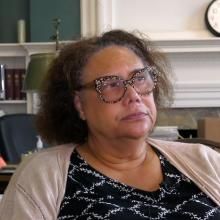
Phylissa Mitchell
Virginia L. Murray Elementary School, Stone Robinson Elementary School, Burley High School, Albemarle High SchoolBiography
Phylissa Mitchell is a product of Albemarle County Public Schools, a journey that began in 1960 in the so-new-you-could-smell-the-paint Virginia L. Murray Elementary, one of myriad schools intended for Black children built across the state in the late 1950s to prolong segregation. She later followed the path created by The Albemarle 26, Black children who integrated Stone Robinson Elementary School, many of them her family. Phylissa’s early social life was grounded in an extensive family network and its church, Zion Hill Baptist. A self-described “jock,” always in motion, she arrived at Albemarle High School in 1969 a sophomore eager to try out for basketball and cheerleading, a sport that rigorously toed the color line. Five years after Burley High School closed, no Black girl who tried out had ever earned enough points to make the cheer squad. Principal Ben Hurt changed that. In the spring of 1970, he appointed rising senior Darlene Quarles and rising junior “Denni” Mitchell, the Black girls who scored the most try-out points to the varsity squad. The appointments exposed them to some “white hostility” at home. But the animus was overt on opponents’ fields and courts across the state. The girls were buoyed by the African American community who cheered the cheerleaders as robustly as the boys playing the games.
Mitchell’s strong love of learning, commitment to education, and desire to “wring out of [life] and put into it as much joy as you’re able to” subsequently took her to UVA in 1972, followed by a law degree from Washington and Lee, a career in journalism and diversity education, and a Fulbright grant teaching First Amendment law and journalism skills at the Institute of Journalism of Taras Shevchenko National University of Kyiv from 2008-10.
Full Interview
Clips
“I got a locker to myself. Why would I care?”
Phylissa Mitchell
“I can’t say anybody was really happy about it.”
Phylissa Mitchell
“I thought that race was where people drove in a circle.”
Phylissa Mitchell
Phylissa Mitchell
“It would have been more difficult if we didn’t have such boosters in the Black community.”
Phylissa Mitchell
“It was the first time I had experience white hostility in such an organized fashion.”
Phylissa Mitchell
“The purpose of athletics is to teach young people the lesson of working hard to achieve a goal.”
Phylissa Mitchell
“It’s really hard to reach any idea of equanimity or equity unless you understand your history.”
Phylissa Mitchell
“If you don’t let go of that privilege, we are just going to be mired here.”